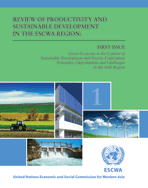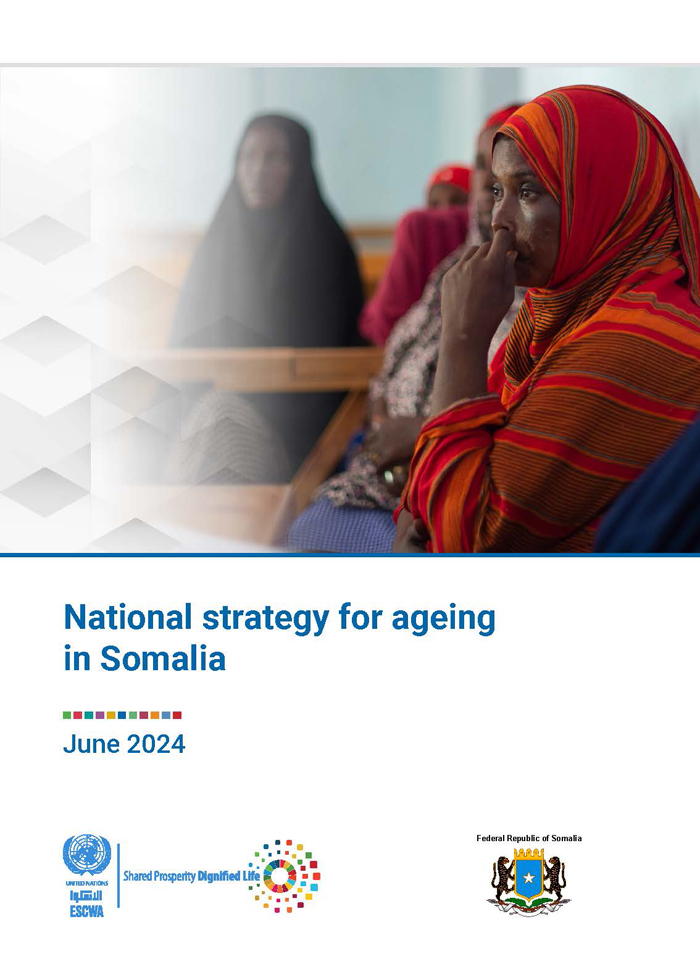
ESCWA Publication: E/ESCWA/SDPD/2011/3
Country: Arab region
Publication Type: Reports & studies
Cluster: 2030 Agenda and SDG Coordination
Focus Area: Climate change, Governance & enabling environment, Inclusive development, Natural resource sustainability, Technology & innovation
Initiatives: Arab Forum for Sustainable Development
SDGs: Agenda 2030
Keywords: Arab countries, Civil society, Climate change, Development plans, Energy resources, Governance, Green economy, Poverty mitigation, Private sector, Productivity, Sustainable development, Technological innovations, Environmental aspects, Unemployment, Policy making
Review of Productivity and Sustainable Development in the ESCWA Region, First Issue. Green Economy in the Context of Sustainable Development and Poverty Eradication: Principles, Opportunities and Challenges in the Arab Region
January 2011
The Arab region continues to face many challenges in its endeavour to embrace the principles of sustainable development. The rapid increase in population, acute water scarcity, food security, energy security, environmental deterioration, unsustainable consumption and production patterns in various sectors are the key persistent pressures that hinder the implementation of integrated policies in the region. This has been exacerbated by several global crises that have struck the region, including chiefly the ongoing financial crisis, the food crisis and climate change impacts which are projected to deepen in the future. The recent economic growth in many Arab countries has not translated into favourable impacts on income distribution and, consequently, into social equity in those countries. This was evident in the recent uprisings across the region, the so-called Arab Spring, which aims above all to establish more democratic processes and better welfare and social equity in these countries. A new vision is therefore required that can drive effectively the sustainable development vehicle in the entire Arab region. Within that context, the green economy has proven, globally, to be an effective pathway for implementation of sustainable development initiatives with consideration of an equal balance between its three main pillars, namely economic, environmental and social dimensions. This study provides the principles and concepts of green economy for achieving sustainable development within the context of poverty eradication. It presents a review of the current regional status, identifies challenges to and concerns by Arab countries, and provides some insight into regional and global success stories on green economy opportunities in such sectors as renewable energy, energy efficiency, sustainable transport, water use efficiency, organic agriculture, solid waste management and construction. The study proposes a set of actions for the transition to a green economy in the Arab region, including strengthening the role of the private sector and civil society through partnerships, accelerating regional integration, promoting national education and research and development systems, improving vocational training, and boosting technological transfer and innovation and new financial mechanisms. Of equal importance, green economy principles need to be merged into national development plans and regional policies, and must be supported by good governance system in terms of new sets of legislation and financial instruments.
Related content
Climate change
, Governance & enabling environment
, Inclusive development
, Natural resource sustainability
, Technology & innovation
,
The Arab region continues to face many challenges in its endeavour to embrace the principles of sustainable development. The rapid increase in population, acute water scarcity, food security, energy security, environmental deterioration, unsustainable consumption and production patterns in various sectors are the key persistent pressures that hinder the implementation of integrated policies in the region. This has been exacerbated by several global crises that have struck the region, including chiefly the ongoing financial crisis, the food crisis and climate change impacts which are projected to deepen in the future. The recent economic growth in many Arab countries has not translated into favourable impacts on income distribution and, consequently, into social equity in those countries. This was evident in the recent uprisings across the region, the so-called Arab Spring, which aims above all to establish more democratic processes and better welfare and social equity in these countries. A new vision is therefore required that can drive effectively the sustainable development vehicle in the entire Arab region. Within that context, the green economy has proven, globally, to be an effective pathway for implementation of sustainable development initiatives with consideration of an equal balance between its three main pillars, namely economic, environmental and social dimensions. This study provides the principles and concepts of green economy for achieving sustainable development within the context of poverty eradication. It presents a review of the current regional status, identifies challenges to and concerns by Arab countries, and provides some insight into regional and global success stories on green economy opportunities in such sectors as renewable energy, energy efficiency, sustainable transport, water use efficiency, organic agriculture, solid waste management and construction. The study proposes a set of actions for the transition to a green economy in the Arab region, including strengthening the role of the private sector and civil society through partnerships, accelerating regional integration, promoting national education and research and development systems, improving vocational training, and boosting technological transfer and innovation and new financial mechanisms. Of equal importance, green economy principles need to be merged into national development plans and regional policies, and must be supported by good governance system in terms of new sets of legislation and financial instruments.



